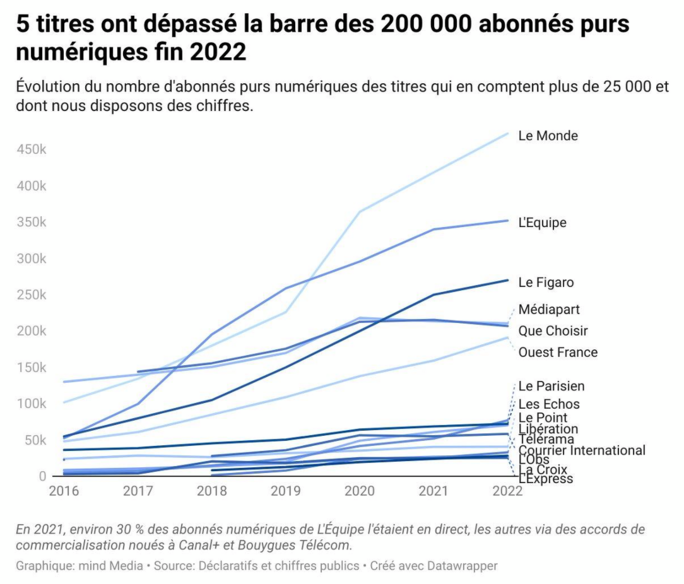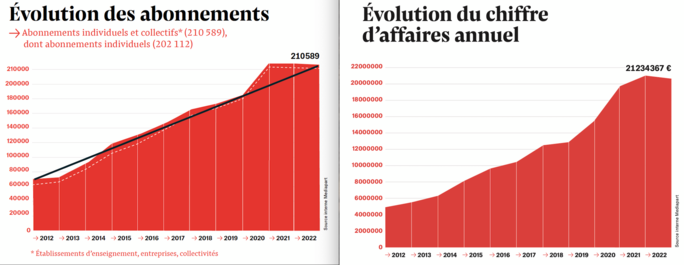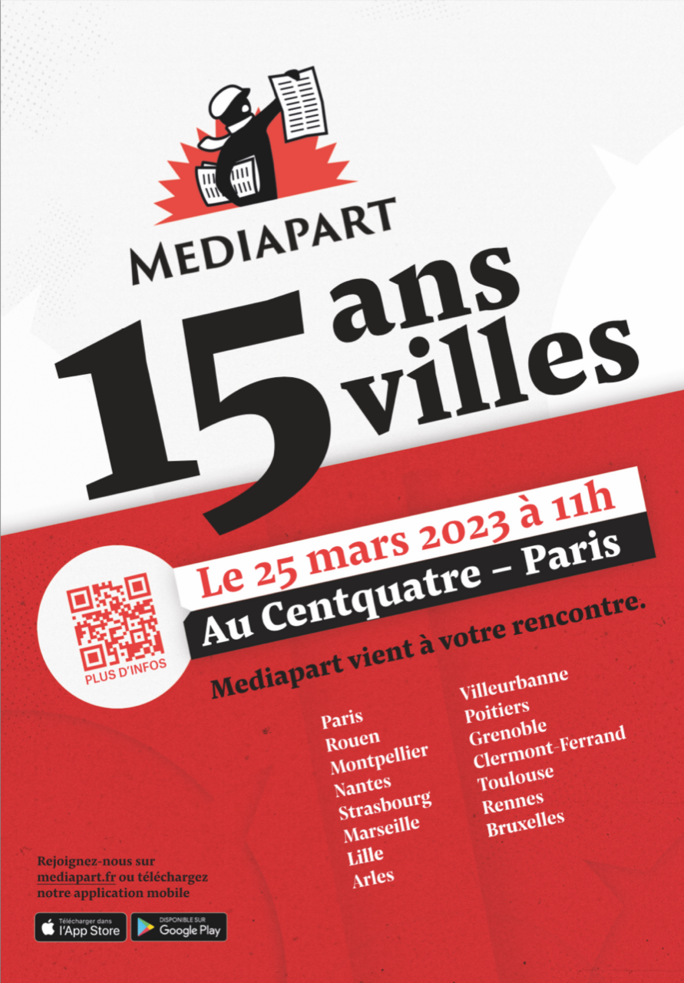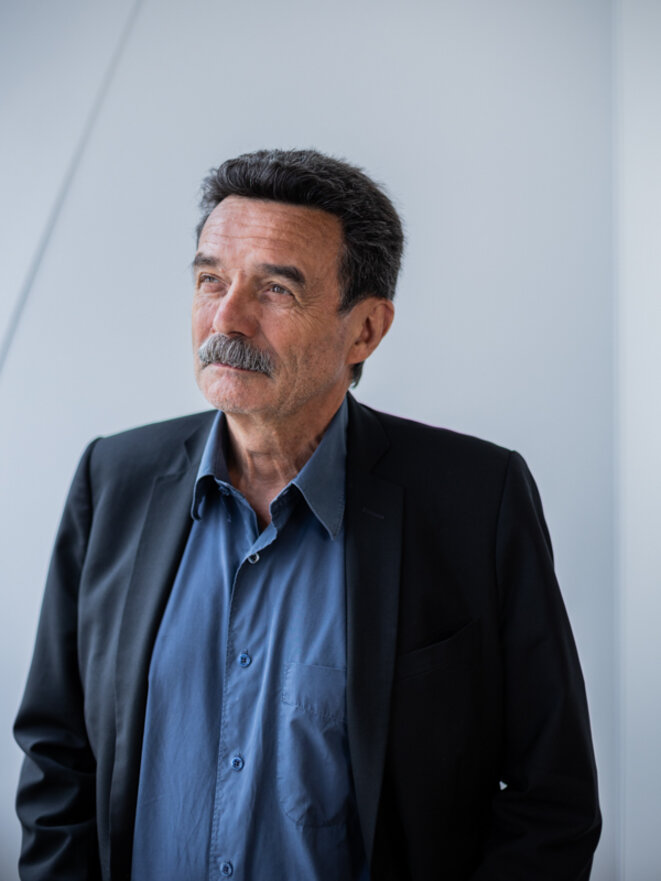Fifteen years after its launch on March 16th 2008, Mediapart confirms the special place it occupies in the French media landscape, as I detailed in the introduction to our yearly press conference held last week in our Paris offices (see the video above).
The place of our online journal is special because of its exceptional success. In the space of 15 years, the numbers of its subscribers (consistently more than 200,000 over the past three years already) place it among the top five online press titles in France in which also figure Le Monde, L’Équipe, Le Figaro and Que choisir. If one leaves aside from that list the sports daily L’Équipe and the specialist consumer magazine Que choisir, Mediapart is among the top three of the most-read online press of daily news reporting (a press whose print sales have become residual, as reported here by Laurent Mauduit).
Moreover, it is a success that has involved no artifice: unlike our two competitors, Le Monde and Le Figaro, all subscriptions to Mediapart are made directly and without the involvement of any intermediaries – without marketing partnerships or commercial agreements with digital platforms or telephone operators.

Agrandissement : Illustration 2

Founded on an exemplary economic model which depends entirely on the loyalty of its readers and on no other contribution, neither from advertising revenue, nor public aid nor private shareholders, this special place occupied by Mediapart has been reinforced by the safeguarding of its independence as guaranteed by the Fonds pour une presse libre (“Fund for a Free Press”, whose website is presented in English here), which is a non-profit structure serving the public interest.
Thanks to solid finances, which our results for 2022 confirmed despite an unfavourable context for all of the press, Mediapart was able to completely repay, well before it was due to, the loan taken out during that operation.
Mediapart is in fine health, and the co-founders are progressively handing over the reins to a new managerial team. Editorial directors Stéphane Alliès and Carine Fouteau have taken over, since 2018, from co-founder François Bonnet, who now presides the Fund for a Free Press. Journalist Fabrice Arfi has taken the place within our board of governors of co-founder Laurent Mauduit, who retired last year, while co-founder Marie-Hélène Smiéjan, without whom we journalists would never have known how to build a viable and enduring enterprise, this year hands over her post to Cécile Sourd, our new general manager.
Cécile, 41, has been a member of staff at Mediapart for five years, holding the post of financial and administrative director. Previously, and following university studies in history and political sciences, she worked over a period of ten years as head of staff in the administrative services of towns in the suburbs of Paris and Lyon.
It was therefore Cécile who presented Mediapart’s accounts figures and results for the year 2022 at our press conference this month. To summarize, these remain positive, with a total of 210,589 subscribers, a turnover of 21.2 million euros, current earnings of 3.7 million euros, and net earnings of 2.6 million euros (representing 12% of turnover).
The charts below show, over the period 2012-2022, the evolution of Mediapart subscriber numbers (left) and (right) the evolution of turnover.

Agrandissement : Illustration 3

All of our 2022 results are detailed in the brochure (in French) that can be downloaded by clicking on the box below:
Le carnet des 15 ans de MediapartIn the brochure, you will notably find information about social policies at Mediapart, which currently employs 139 staff (72 women and 67 men), of which 73 are journalists. The wage ratio – the gap between the highest and lowest salaries of staff – is 3.37. For the past ten years, a counter-inflation payment is included on all staff salaries (and which represented + 6.2% in January 2023). Under the official French index for professional equality between men and women employees, which is evaluated according to a number of criteria including salaries and promotion opportunities, Mediapart is noted 100/100.
As part of this exercise in transparency, and which is unique among the French media, the Mediapart team has decided, as part of our 15th anniversary celebrations, to meet and exchange with its public in a series of events throughout the year in 15 different towns and cities. The first of these events will be held in Paris on March 25th at the CentQuatre cultural centre, and the last will be in Brussels in December.

Agrandissement : Illustration 5

The following words were written 55 years ago but could have been written today to mark the 15 years of Mediapart’s faithful service in the public interest through its revealing and impactful journalism. They were by French philosopher Paul Ricœur in his preface to a 1968 book by journalist Jean Schwœbel, La Presse, le Pouvoir et l’Argent (roughly translatable as “the press, the powers that be, and money”), and in which Ricœur noted that the struggle of journalists for their independence “is a combat with and against the rest of the mass media”.
“These,” he added, “have two slopes: downward and upward. The downward slope is that of the commercialised press, for which information is a commodity. Subjected to the imperatives of advertising and vast print runs, seeking out the sensational, it amplifies prejudices and hatreds, and maintains the collective egoism of wealthy nations, the instinctive chauvinism and latent racism among the population. The quality press, then, is responsible not only for informing the facts and events, but also for ‘speaking against’ the prejudices of the crowd. What the public must demand, that which it must have an appetite for, is a press which resists this weight of the mass media, and which fights the temptation to manipulate, to degrade and sometimes to debase, which is that of the commercialised press.”
That observation is as true as ever. From the mass media, the radio and TV channels that are freely accessible and rolling, to the social media and their irresponsible anonymity, we are henceforth confronted with the advent of a democracy of opinions, which is the contrary of an informed democracy, respectful of itself and aware of its fragility. The freedom of speech, to say everything including the worst and the despicable, has even become the alibi for the liberation of racism, the Trojan horse of a general negation of an equality of rights that is the primary principle of a democratic culture – one without distinction of origin, of condition, of faith, of appearance, or of gender.
The journalism that Mediapart, since 2008, illustrates, promotes and defends, and whose values are radically democratic, is situated in the camp of an informed democracy. That is what we intend to underline in 2023, on the occasion of this 15th anniversary, with a communications campaign on the theme (see below) of “Without us, you would not have known it” to illustrate, with examples to hand, just how much our investigations have revealed – and continue to reveal – realities which would otherwise have remained buried, hidden and hushed up.

Agrandissement : Illustration 6

This collective audacity depends upon one resource alone: the support of our subscribers, which has never faltered (and if you haven’t yet subscribed, you can do so here). It is thanks to their numbers and loyalty that Mediapart has the means to be independent, without ever submitting to the otherwise corrupting practices that lie in capitalistic ownership, state subsidies, the dependency upon advertisers and the financial aid provided by digital platforms.
Please receive the warmest thanks from all of those who, day after day, produce this online journal.



